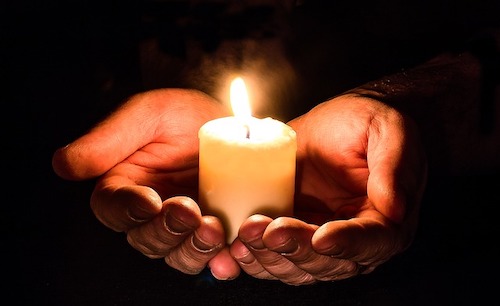Helping Homosexuals Change? Yeah, Right.
ABC News recently did a story on presidential candidate Michele Bachmann’s family business, a Christian counseling center run by her husband, Dr. Marcus Bachmann. The focus of the story was a biased, “can you believe this?” exposé of the fact that the counselors help people who don’t want to be gay, address their unwanted homosexuality.
They interviewed two people, a man whose mother had taken him to the clinic when he came out as homosexual, and an undercover reporter who brought two recording devices into the sessions with him. Neither man believed their homosexuality was changeable—and when it comes to the counseling office, if your mind is made up that something cannot be changed, guess what? It won’t be.
The reporter used the now-familiar phrase “pray away the gay,” which is an effective and condescending dismissal of what actually happens when people do successfully shift their sexual orientation. (And I personally know a number of people who have experienced significant and lasting change in their orientation.) Some do successfully engage in reparative therapy, which addresses the emotional deficits in those who find themselves attracted to the same sex using purely psychological methods. But what is more effective is the transforming power of the gospel in the life of a fully devoted follower of Jesus Christ. And, like all discipline of radical discipleship, which means saying “no” to our flesh and “yes” to the flow of Jesus’ resurrection power in our lives, it takes hard work over a period of years. There is no easy, 1-2-3 magic prayer to change the way we think and feel. Sanctification is a long process of cooperation with the Spirit of God.
The message our media pumps out today is that sexuality is fluid—except for homosexuality, which is fixed and can’t be changed. This means it’s okay to give into your secret cravings and come out as gay, in which case folks like Oprah will celebrate you embracing your “authentic self,” but it’s not okay to say, “God didn’t make me gay, and I choose to accept the identity HE gives me instead.” It’s not okay to say, “I used to be gay and now I’m not.”
Which explains why there was an explosion of rage when Dr. Robert Spitzer, eminent professor of psychiatry at Columbia University, released the results of his landmark 2001 study that showed that change is possible in highly motivated individuals: rare, in his estimation, but possible. (Dr. Spitzer had been the pro-gay lobby’s hero since he spearheaded the American Psychiatric Association’s removal of homosexuality from the DSM-IV manual, which is the psychiatrists’ bible of mental disorders. That decision was the result of caving into political pressure, not the result of any research.)
The idea that people can experience change not only in their behavior but in their hearts is threatening to those committed to the idea of homosexuality as a fixed and unchangeable truth. (I personally believe the reason for their insistence is an understandable defensive reaction to trying to change their orientation on their own unsuccessfully, including attempting to “pray away the gay,” which doesn’t work. I have written about why that is, here.)
Many of the loud voices insisting that homosexuality is not changeable hold to an unrealistic standard, that only a complete shift from 100% homosexual to 100% heterosexual constitutes change. I suggest that nowhere else do we hold to that standard: would we denounce a former alcoholic who has successfully lived for years in freedom from the destruction of alcohol, as not really changed if he thinks that a cold beer on a hot day still sounds good?
Dr. Spitzer’s findings back up the message of the New Testament: that Jesus Christ changes the lives and thus the behavior of people caught in all kinds of sin. Remember this list of changed people in the church of Corinth?
Do you not know that the unrighteous will not inherit the kingdom of God? Do not be deceived! The sexually immoral, idolaters, adulterers, passive homosexual partners, practicing homosexuals, thieves, the greedy, drunkards, the verbally abusive, and swindlers will not inherit the kingdom of God. Some of you once lived this way. But you were washed, you were sanctified, you were justified in the name of the Lord Jesus Christ and by the Spirit of our God. (1 Corinthians 6:9-11)
Change is possible. That is part of the good news of the gospel. And, for the believer in Jesus, change is a normal and expected part of being a follower of Christ.
Even if the world laughs at the notion with a “can you believe this?” contempt. Can homosexuals change? It’s not “yeah, right.” It’s “yes! Amen!”



4 Comments
Mike Stickler
Valid Point
I have worked in and around the addicted a good part of my career. The addiction disease model actually implies that addiction is not a choice and the inflicted have no real chance to change. Thus society has the term, “once an alcoholic, always an (recovering) alcoholic”. The problem with this view of addiction, homosexuality or any other disorder, is it becomes something you can never get victory over. The reasoning is because it’s deemed not your fault, and you have a disease. The only difference here is the Gay Agenda has a better, more organized PR department winning the hearts and minds of the public (including Christians) who refuse to think critically. The missing part, submission to a Biblical pattern and the Lordship of Christ in ones life will bring 100% change, making a whole and satisfied person. This is proven everyday in the lives of believers
Sue Bohlin
Additional downside to the Addiction Model
Thanks for your input, Mike. I've been having a problem with the disease model of addiction for a number of years because while it conveniently absolves people of guilt ("It's not your fault, you're sick"), it also gives no way out of that box/identity. When do we do, then, with Jesus' promise that "if the Son sets you free, you shall be free indeed"? Do we dismiss the Savior's promise as archaic and outdated because He couldn't possibly have understood modern psychology and brain chemistry?
Lane
I am Free Indeed!
I have been free of alcohol and drugs for over 15 years and can say for sure that I am free from the addiction of alcohol. When I first began my recovery, I used the 12 step program to help me get started in recovery. I was a third generation alcoholic who started drinking and using drugs at a very young age. My first memory of getting high was with my aunt and uncles. I was six years old.
It was always around me as a child. My mother drank and the rest of the family did drugs. I thought I would always live like this. During the early years of my sobriety, I started to search for the truth. I was sober, but lived as nothing more than a dry drunk. Even though they tried to tell me my addiction was genetic, I knew that my "disease" was something other than disease. When I had six years sobriety, I came face to face with Jesus and immediately knew that I was free from addiction and my addiction was actually a result of my selfish sin nature. It had been trained into me at an early age, but it was sin nonetheless. It is the power of the Gospel that frees us form our sin.
Many in the homosexual arena try to make us think homosexuality, like alcoholism, is nothing more than a genetic difirence. As a Native American, this makes me sick every time I hear it. To think that my ethnicity could be equated to homosexuality. This logic makes being alcoholics and child molestors as much a crap shoot as being blonde or brunette. Our society is just too afraid to call sin what it really is. We all need the savior to free us from our sin, and I know in my heart if a person truly receives the Gospel and Salvation of Jesus Christ, they will find that freedom.
I completely agree with Mike that the Gay Agenda has turned this upside down and a majority of them want to continue with their acts without having to be told they are in sin. They are no different than the rest of the lost world, except they have lobbyists on their side.
Sue Bohlin
Jesus set you free!
Thank you for sharing your terrific testimony, Lane! Praise God!
I don't think it's wise to make a categorical statement about the true motives of a majority of anybody. I think the majority of those who struggle with their same-sex attraction would love for it to disappear, and many are caught in behavior patterns they don't know how to get out of because there are so few Christ-followers showing them how.
You've just described our human flesh in its ugly, depraved state of rebellion. All of us struggle with the flesh. So the us/them dichotomy is very unhelpful and untrue, I think. Every one of us is a messed-up person in need of a total transformation, right? 🙂
Blessings,
Sue